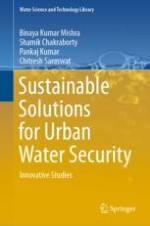This book presents solutions to address water security in rapidly urbanizing cities, and explores the new paradigms of water security in changing contexts. Highlighting the latest developments in water research, changes in water policy, and current discourses on water security, the book also provides information and tools for local stakeholders, water managers, and policymakers to build the capacity for sustainable water governance. The book discusses a wide range of sustainable solutions and their implementation to ensure that the balance between water supply and demand remains sustainable in the long term, with a focus on local solutions to build capacity and developing policy awareness for a wide range of stakeholders. As the concept of urban water security in changing contexts is open to multiple interpretations, the authors set out various approaches.
Providing an overview of the changing perspectives of urban water security in different contexts, the book is based on findings of the Asia-Pacific Network water security project at the United Nations University, Tokyo, as well as the authors' current research-based at Pokhara University, Nepal, Hosei University, Tokyo, Institute for the Global Environmental Strategies, Japan and the Australian National University, Australia. The book also includes the views of international authorities (such as water experts) on the subject. The solutions are complemented by analysis of case studies of various localized sustainable solutions at different scales.
The book is a valuable resource for water professionals and policymakers around the globe, academics, teachers working in water-related areas, NGOs, think thanks, water research institutes, donor organizations, and international and local water utility services.
